M2 Grammar
M2 Grammar

不定式作结果状语
to find (find) He hurried to the school (only) _______
nobody there.
His parents died, only _______(leave) leaving him alone. be told (tell) He hurried to the school only to ________ the bus had left.
such+a+adj.+n.(可单) +that 从句
1. So sudden ___ that the enemy had no time to escape. A. did the attack B. the attack did C. was the attack D. the attack was 2. ___ is the power of TV that it can make a person suddenly famous. A. Such B. This C. That D. So
such+adj.+n.(不可数/可复) +that从句
so+adj.+a+n.(可单) +that从句
so+many/few+n. (可数) +that从句 so+much/little+ n.(不可数) +that从句
• 当so+ adj./ adv. 或 such +被修饰部分置于 句首时,主句要用半倒装。 他讲话声音很大,每个人都能听清楚。 So loudly did he speak that everyone could hear him clearly. 它是一本这么好的书以至于我情不自禁地读。 Such a good book it is that I can’t helpneed do more exercises
外研社高一英语必修二M2-Module-2--Grammar
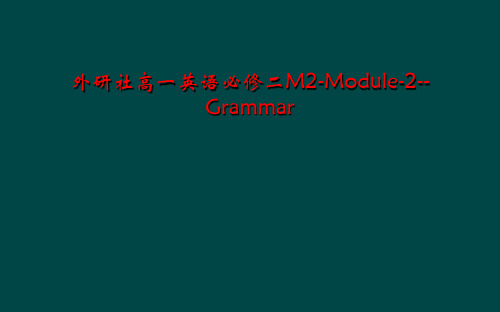
4. It is s_u_c_h_nice weather that I would like to go to the beach. 5. They are _su_c_h_little birds that they look like bees. 6. It was very cold, _so_that the river froze.
【名师点津】
(1)so. . . that. . . 和such. . . that. . . 引导结果状语从句。
形容词或副词 形容词+a(n)+单数可数名词 so+ many/few+复数可数名词 much/little(少)+不可数名词
+that从句
such+
a(n)+形容词+单数可数名词
形容词+复数可数名词
Ⅱ. 单句改错
1. He was worried, such that he couldn’t sleep.
( such改为so)
2. Tom was so an honest man that he was praised.
( so改为such )
3. There are such many picture-story books that the
【要义详析】 一、动词不定式作目的状语 动词不定式作目的状语主要有以下三种表达方式: 1. to do. . . 这种形式通常放在句末, 表示做前面的事去达到后面的 目的。
*The government is taking many effective measures to control fog and haze. 政府正采取许多有效措施控制雾霾。 *He worked late into the night to earn enough money. 为了赚到足够的钱, 他工作到深夜。 *He went all the way to complete his novel on time. 他尽最大努力为了按时写完小说。
m2grammar
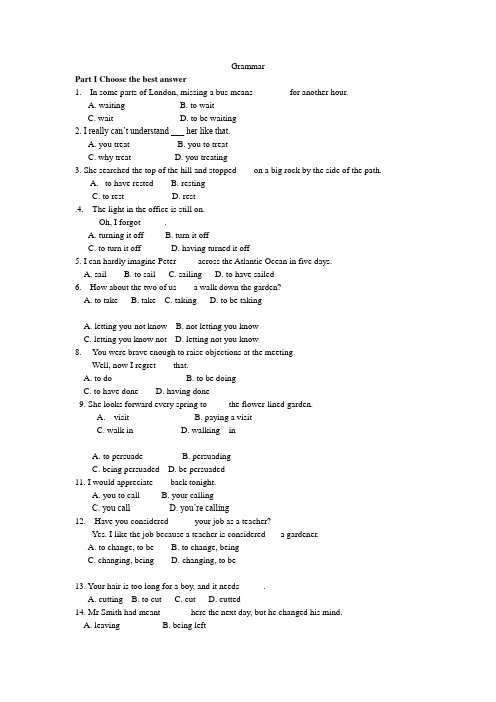
GrammarPart I Choose the best answer1.In some parts of London, missing a bus means________ for another hour.A. waitingB. to waitC. waitD. to be waiting2. I really can’t understand ___ her like that.A. you treatB. you to treatC. why treatD. you treating3. She searched the top of the hill and stopped ___ on a big rock by the side of the path.A.to have restedB. restingC. to restD. rest.4.---The light in the office is still on.--- Oh, I forgot _____.A. turning it offB. turn it offC. to turn it offD. having turned it off5. I can hardly imagine Peter ____ across the Atlantic Ocean in five days.A. sailB. to sailC. sailingD. to have sailed6.How about the two of us ___ a walk down the garden?A. to takeB. takeC. takingD. to be takingA. letting you not knowB. not letting you knowC. letting you know notD. letting not you know8. ---You were brave enough to raise objections at the meeting.---Well, now I regret ___ that.A. to doB. to be doingC. to have doneD. having done9. She looks forward every spring to ____ the flower-lined garden.A. visitB. paying a visitC. walk inD. walking inA. to persuadeB. persuadingC. being persuadedD. be persuaded11. I would appreciate ___ back tonight.A. you to callB. your callingC. you callD. you’re calling12.---Have you considered _____ your job as a teacher?---Yes. I like the job because a teacher is considered___ a gardener.A. to change, to beB. to change, beingC. changing, beingD. changing, to be13. Your hair is too long for a boy, and it needs _____.A. cuttingB. to cutC. cutD. cutted14. Mr Smith had meant ______ here the next day, but he changed his mind.A. leavingB. being leftC. having leftD. to leave15. That you gave him such a book to read meant _____.16. One learns a language by making mistakes and ______ them.A. correctB. correctingC. correctsD. to correct17. She meant _____ but the look on your face suggested “No”.A. explainingB. to explainC. explanationD. to be explained18. — When did you go to the States?— I remember _____ there when I was ten.A. having takenB. to be takenC. being takenD. to take19. He is so busy that he can’t help _____ the classroom.A. cleaningB. to cleaningC. to cleanD. cleaned20. The discovery of new evidence (证据) led to _______.A. the thief having caughtB. catch the thiefC. the thief being caughtD. the thief to be caught21. — I have been knocking at the door, but noone answers.— Why not ____ at the back door?A. try knockingB. try to knockC. to try knockingD. to try to knock22. As a young man from a rich family, can you imagine ____ in such a small and dirty place?A. to workB. yourself to workC. workingD. work23. My uncle is considering ______ his heath.A. improveB. to improveC. improvingD. to be improved24. We should keep ________ English every day.A. to practise speakingB. practise speakingC. practising speakingD. practising to speak25. He got well-prepared for the job interview, for he couldn’t risk _______ the good opportunity.A. to loseB. losingC. to be lostD. being lost26. She was so angry that she felt like ______ something at him.A. to throwB. to have thrownC. throwingD. having thrownA.to prepareB. to be preparedC. preparingD. being prepared28. The form needs ______ in ink.A. filling inB. to fill inC. being filled inD. to be filled29. Does your shirt require ______, sir?A. being pressedB. to pressC. to be pressedD. to be pressing30. Smith enjoys ______ football on Sunday afternoon, doesn’t he?A. to be playingB. to playingC. to playD. playingPart II Fill in the blanks1. I was reading the text when the teacher told me to stop ____________(translate) two sentences.2. I regret __________(lend) him so much money. He never paid me back.3. I was busy __________ (cook) when the telephone rang, so I asked my son to answer it.4. When he got to London, he had no difficulty ___________(find) his way to the famous bridge.5. Do you remember John and his father ___________(come) to see us last Christmas?7. The teacher hates students ___________(talk) in class.8. Sorry, I didn’t mean ____________ (hurt) you.9. I really appreciate your ___________(allow) me to use your bike.10. He was sad when he realized that he had forgotten ____________(invite) Tome to the party.Part III Translation1. 父亲决定戒烟。
M2U2Grammar 学案及答案
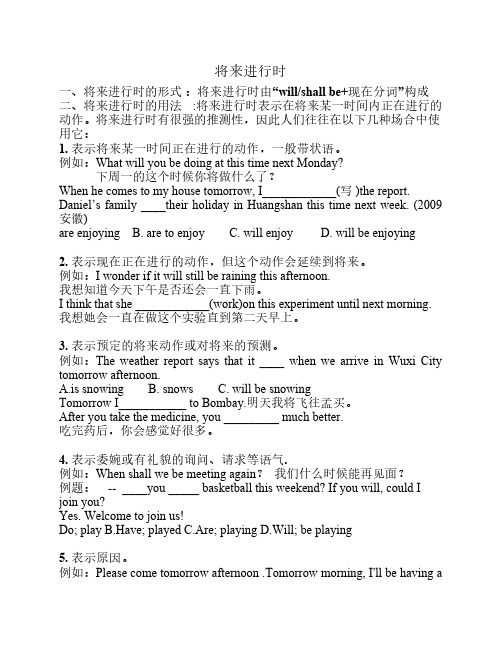
将来进行时一、将来进行时的形式:将来进行时由“will/shall be+现在分词”构成二、将来进行时的用法:将来进行时表示在将来某一时间内正在进行的动作。
将来进行时有很强的推测性,因此人们往往在以下几种场合中使用它:1. 表示将来某一时间正在进行的动作,一般带状语。
例如:What will you be doing at this time next Monday?下周一的这个时候你将做什么了?When he comes to my house tomorrow, I____________(写 )the report. Daniel’s family ____their holiday in Huangshan this time next week. (2009安徽)are enjoying B. are to enjoy C. will enjoy D. will be enjoying2. 表示现在正在进行的动作,但这个动作会延续到将来。
例如:I wonder if it will still be raining this afternoon.我想知道今天下午是否还会一直下雨。
I think that she ____________(work)on this experiment until next morning.我想她会一直在做这个实验直到第二天早上。
3. 表示预定的将来动作或对将来的预测。
例如:The weather report says that it ____ when we arrive in Wuxi City tomorrow afternoon.A.is snowingB. snowsC. will be snowingTomorrow I___________ to Bombay.明天我将飞往孟买。
After you take the medicine, you _________ much better.吃完药后,你会感觉好很多。
M2P2 Grammar1
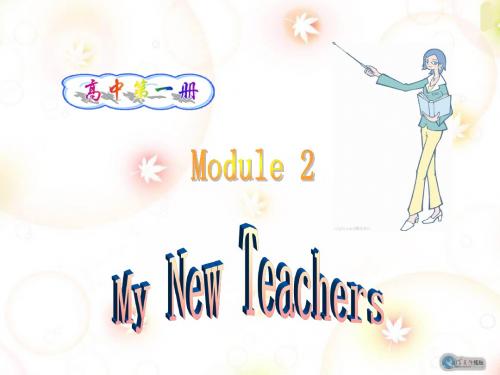
5. -- Can I smoke here? -- Sorry. We don’t allow ____ here. (2007 江苏) A. people smoking B. people smoke C. to smoke D. smoking 6. All the staff in our company are considering ____ to the city centre for the fashion show. (2007 上海春) A. to go B. going C. to have gone D. having gone
Байду номын сангаас
⑤ 有时动词-ing形式前面可有自己的 逻辑主语。如: Would you mind my opening the door? 我打开门你介意吗? Would you mind my sitting next to you? 你不介意我坐你旁边吧?
Exercise
1. In some parts of London, missing a bus means________ for another hour. A. waiting B. to wait C. wait D. to be waiting 2. The discovery of new evidence (证据) led to _______. A. the thief having caught B. catch the thief C. the thief being caught D. the thief to be caught
regret doing 对于„„感到遗憾/后悔 regret to do sth 因„„感到遗憾 I regret lending him so much money. He never paid me back. 我很后悔借给他那么多钱。他从来没 有还过我。 I regret to tell you that you failed the test. 我遗憾的告诉你,你没有通过考试。
高中英语 M2 Grammar课件 外研版选修6
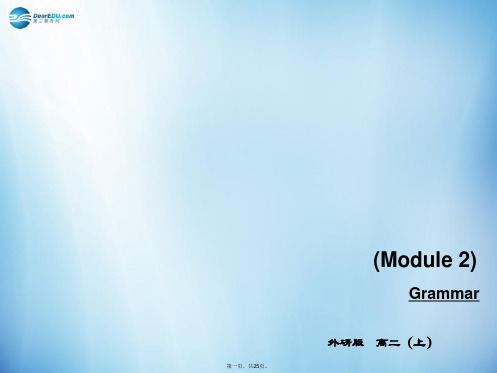
2. Blackie ran over to the window, barking and wagging his tail.
3. The children walked along the West Lake, talking and laughing.
第十一页,共25页。
D. Indicating MANNER(方式(fāngshì)) 1. Three times the villagers came running to the
uneasy .= (When he meets…,) 2. While eating supper, I often watch English
news.= (When I eat …,) 3. After doing his homework, Tom went out to play
football with his friends. =(After he did…,) 4. Since leaving school, I’ve never seen some of
1. I talked to John for three hours, trying to persuade him to give up his plan. (in order to)
2. We asked some scientists and looked up the dictionaries, searching for a correct answer to our question.(in order to)
第十三页,共25页。
Conj.+-ing (present participle) as an adverbial when, while, before, after, since +-ing as an
高中英语必修二M2U2 grammar课件(共14张PPT)
B. never thought; were going
C. didn’t think; were going
D. hadn’t thought; were going
7. Because the shop _____ , all the T-shirts are sold at half price.
Future continuous + future in the past
将来某个时刻正在进行的动作. Please don’t call me between 8 and 10 tomorrow. I’ll be having my classes then. 明天8点到10点之间请不要给我打电话,我那时正在上课。
A. has closed down
B. closed down
C. is closing down
D. had closed down
8. Turn on the television or open a magazine and you _____ advertisements showing happy families.
was/were about to 表示即将要发生的动作, 不与表示时间段的状语连用。 The bus was about to start.
were/was about to ...when… were/ was on the point of doing…when… I was about to go out when he dropped in. 我刚要出去,这时他来了。 We were on the point of leaving when it started to rain. 我们刚要走,这时突然下起雨来。
M2 unit 2 grammar
What tense is used in the sentences below:
Many teenagers like reading adventure stories. simple present I have read about an adventure in Africa. present perfect Toby and Colin will live with the local people in their villages. They will be walking everyday for two weeks.
Future continuous tense
They held a party on the campus last Simple past weekend. You were having a meeting at this Past continuous time yesterday. He is now living an interesting life in Present continuous Africa.
Lead-in
Look at the following sentences and try to explain why the tense is used in these sentences.
1. We leave London on 15 July, and we’ll be taking a flight to Morocco, in northern Africa. 2. Since we will be walking for almost two weeks, I’ll need to buy a large backpack in advance to carry my supplies of food and water.
M2 Unit 3 Grammar
How time flies! It’s about four months since we began our high school life. The high school life is an interesting and colorful one. Soon after the Our headteacher, Mr. Lai, is a kind but strict man. Soon after the were told start of school, we ____________ (tell) about some rules by him. school will be punished And if we break the rules, we ________________(punish). rules months, In the last four months however, we have made a lot of have been replaced progress. For example, some bad habits ________________(replace) by good ones. What’s more, a lot of activities _____________ have been organized (organize) for us. have been made to Since last week we ___________________(make) run in the week, morning. It is really a good way to exercise in the cold winter. Still, there are some bad things. For example, we__________________ (give) tests every month which of month, are given usually not welcomed is course______ usually___________ (not welcome) by most of us. in the future Anyway, the term is almost at an end now. In the future, I’m sure more things ___________(do) to make our life better. will be done
M2_U2_grammar
A. regarded
B. was regarded
C. has regarded D. had been regarded
解析:答案B。题意为“因为在奥运会上 赢得金牌,他被认为是一个民族英雄”, 需用被动结构。而D是过去完成时,不合 题意。
Passive Voice In passive voice, the subject receives the action expressed by the verb: A song was written by the student.
主动态变被动态三部曲:
1.宾语变主语 2.加be动词,动词变成过去分词 3.加by和动作发出者 Atlanta’s father didn’t allow her to take part in the Olympic Games.
1.will/ shall do (be done) 2.be going to do (be done) 3.be to do (be done) 4.be about to do (be done) 5. 现在进行时表示将来 6. 一般现在时表示将来
a. He will plant more trees.
注意:
在时间、条件状语从句中,用一般现在时的被 动语态代替一般将来时的被动语态。
Our living condition will be greatly improved if more new houses are built in the future.
He says he will leave the company if he is punished for this.
高考链接
This is Ted’s photo. We miss him a lot. He ___C____ trying to save a child in the earthquake.
- 1、下载文档前请自行甄别文档内容的完整性,平台不提供额外的编辑、内容补充、找答案等附加服务。
- 2、"仅部分预览"的文档,不可在线预览部分如存在完整性等问题,可反馈申请退款(可完整预览的文档不适用该条件!)。
- 3、如文档侵犯您的权益,请联系客服反馈,我们会尽快为您处理(人工客服工作时间:9:00-18:30)。
3
在句中作状语的不定式表示的是主语的目的, 在句中作状语的不定式表示的是主语的目的,因 其逻辑主语通常是句子的主语。比较: 此,其逻辑主语通常是句子的主语。比较: To draw maps properly, you need a special pen. (正) To draw maps properly, a special pen is needed. (误)
二、作结果状语。动词不定式作结果状语常用于 作结果状语。 so+形容词 副词 as to… 形容词/副词 形容词 副词+ such+名词 名词+as to… 名词 too ... to ... enough to … only to … 等结构 1)The boy is not tall enough to reach the bookshelf. ) 2)The girl was so kind as to help the old man off the ) bus. 3)He searched the room only to find nothing. )
II. Functions: 1. 主语 To talk to him is a great pleasure. To see once is better than to hear a hundred times. (1)常用 作形式主语,把不定式移到后面。 常用it作形式主语,把不定式移到后面。 常用 It’s wrong to give up such a good chance. (2)若不定式的动作是谁做的,可用 for/ of sb. to do 若不定式的动作是谁做的, 若不定式的动作是谁做的 It’ll be a mistake for you not to help him. 但在 kind, good, nice, wise, clever, silly, stupid, foolish, wrong, right, careless, brave, rude, honest, impolite 等作表语时, 用of引出逻辑主语。 等作表语时, 引出逻辑主语。 引出逻辑主语 It’s wrong of you to have made such a decision.
2
试分析: 试分析: We took an umbrella so as not to get wet. He came to school by taxi this morning in order not to be late again. 不定式由 “ to + v.” 构成,否定式为“not to + 构成,否定式为“ v.”
目的状语从句与不定式的转换 目的状从,还可变为不定式或不定式短语作状语, 目的状从,还可变为不定式或不定式短语作状语, 从而使句子在结构上得以简化。可分为两种情况: 从而使句子在结构上得以简化。可分为两种情况: 1. 当目的状语从句中的主语与主句中的主语相同时, 当目的状语从句中的主语与主句中的主语相同 主语相同时 可以直接简化为不定式或不定式短语作状语 为不定式或不定式短语作状语。 可以直接简化为不定式或不定式短语作状语。 We'll start early in order that/so that we may arrive in time. We'll start early in order to/so as to arrive in time. 2. 当目的状语从句中的主语与主句中的主语不相同时, 当目的状语从句中的主语与主句中的主语不相同 主语不相同时 要用动词不定式的复合结构作状语。 动词不定式的复合结构作状语 要用动词不定式的复合结构作状语。 I came in order that you might read my report. I came (in order) for you to read my report.
8
9
The Infinitive
I. Forms: to do to be doing to have done to have been doing to be done to have been done
To talk is one thing ; to do is quite another. The problem still remains to be seen. They seem to be talking something important. We are happy to have been working with you. I was to have attended the party, but I was too busy then. The book is said to have been translated into many languages.
Have a try ~ ~: ~: 1. The purpose of new technologies is to make life easier ____ it more difficult. (MET99) A. not make B. not to make C. not making D. do not make 2.Allen had to call a taxi because the box was _______ to carry all the way home. (MET2003) A. much too heavy B. too much heavy C. heavy too much D. too heavy much 3.____late in the afternoon, Bob turned off the alarm. (2001年北京春季高考 年北京春季高考) 年北京春季高考 A. To sleep B. Sleeping C. Sleep D. Having sleep
Grammar
Grammar 1
The infinitive of purpose
一. 不定式作目的状语 试分析: 试分析: We should do whatever we can to help them. We got up early in order to catch the school bus. 不定式作目的状语, 常放在被修饰词后, 不定式作目的状语, 常放在被修饰词后,但为了强 调也可放在句首, 此时其后常有逗号。 调也可放在句首, 此时其后常有逗号。加强语气时 as, ,不定式前可加 in order 或 so as,即构成 in order to,so as to。 to, to。 注意: 不能用于句首; 则可以。 注意 so as to 不能用于句首;in order to 则可以。
4. 补语 在ask, tell, invite, force, beg, allow, wish, expect, warn, cause 等后跟不定式作补语。 等后跟不定式作补语。 The boss forced us to work fourteen hours a day. (1) 在使役动词 在使役动词make, let, have, 及感官动词 及感官动词see, watch, notice, observe, look at, feel, hear, listen to后不定式作补语省 to; 但变为被动语态时再加to. 后不定式作补语省 但变为被动语态时再加 被动语态时再 后不定式作补语 We saw him fall off the tree. → He was seen to fall off the tree;. (2) 在think, consider, believe, know, feel, find, 等后 的复合宾语,不定式多用 不定式多用to 的复合宾语 不定式多用 be 或 to have done We found the answer to be satisfactory. I believed him to have left the country. (3) 在be said/ reported/ known 等后也常用不定式。 等后也常用不定式。 He’s said to be from abroad. He’s known to be an honest man.
2. 表语
Her wish is to become a doctor. He appears to be fifty.
3. 宾语 常跟在 常跟在want, decide, hope等很多动词之后。 等很多动词之后。 等很多动词之后 He wished to be a doctor in a mountain area. *(1) tell, show, teach, know 等后常用“疑问词+ to 等后常用“疑问词 do” Please show me how to run the machine. (2) 作形容词 作形容词ready, eager, anxious, happy, glad, sure, sorry, afraid 等的宾语。 等的宾语。 I’m sorry to have done that.
5. 定语 (后置) 后置) This is the best way to solve the problem. I have something to tell you. *(1) 常表即将发生的动作。 常表即将发生的动作。 The meeting to take place next month is of great importance. (2)与所修饰的词常有动宾关系 不定式用主动表被动 与所修饰的词常有动宾关系(不定式用主动表被动 与所修饰的词常有动宾关系 不定式用主动表被动) I’ve a lot of things to do today. There’s nothing to worry about. (3) 用不定式主动式或被动式,意义上有不同。 用不定式主动式或被动式,意义上有不同。 Have you anything to send? Have you anything to be sent?
